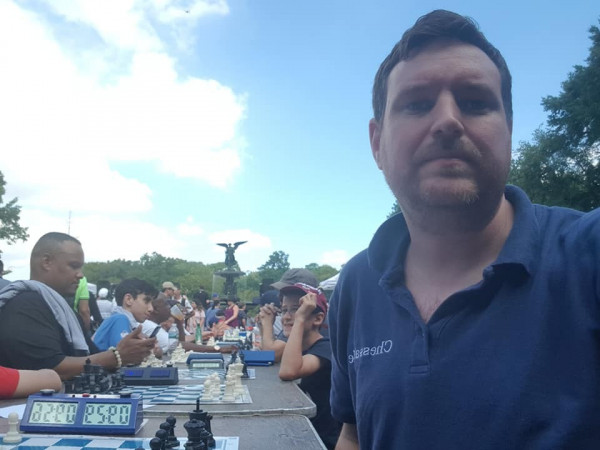
Interview with Leon, a journalist teaching the world to play chess
How did you get started with remote work?
Working remotely came completely out of the blue for me. I was a journalist working long hours at The Telegraph in London. Then one day I was offered a new job by one of my contacts that combined one of my big passions, choosing my own hours and a complete change in career.
I decided to roll the dice and take it, to give up my solid established job working for a big internationally-recognized newspaper and join a tiny team working on Chessable, a start-up chess learning platform.
One year on and I find myself working from home, seeing lots more of my toddler and having a far better work-life balance. It has made an incredible difference in my life.
Read 114 answers from other remote workers
What are you working on?
Right now I'm actually using the training features on the site to get ready for a match I have this evening. I play league chess, and that involves a lot of prep before games. However, the rest of the time I spend most of my day trying to market new courses we offer.
At Chessable, we convert print books into trainable online courses. Our next big release is a book by a very highly-respected Danish Grandmaster called Jacob Aagard. He teaches some pretty high-level stuff, way beyond my level.
His book has been adapted into a course by one of my colleagues, and it was then beta tested by some of our members. I am now putting the final touches to it and writing a marketing email for it. When this course goes live I will also get on social media and try to whip up a bit of enthusiasm about it.
Read 107 answers from other remote workers
What's your typical work routine?
My first task of the day is to drop off my toddler to the nursery, something I was never able to do when I worked in central London because I had to leave too early.
After dropping off the little monkey, I get back to my house at about 8.30 am, sit down in my home office, and fire up my machine. With a coffee, of course.
I usually start the day by solving a few chess puzzles on Chessable to get the little grey cells working (chess puzzles are a big part of chess training as they keep you sharp) and then look into any emails we've received overnight.
This can be customer support, replies from authors or just general chat. An important part of my job is just knowing what's going on in the chess world so I can keep on top of new developments throughout the day.
As I work from home I'm rarely at the big chess competitions as going to them would involve flying around the world which unfortunately the company is not yet big enough to pay for. So interacting with people on Twitter and visiting various chess sites is very useful.
On days we release new courses I will spend most of my time preparing the marketing emails and a social media campaign. They need to be spot on, so I need to know the content of the course very well.
Our courses vary in cost, but my job is to let people know we have a particular book that we have converted into a course. On days that we do not have a new release, I will assist with the process of adapting the courses and getting our next one ready.
All through this, I will be trying to think of new ideas to get Chessable some publicity in the chess press by using my journalism background to find ways that we can talk about our training platform.
Read 92 answers from other remote workers
Do you have a dedicated space to work?
Of course, with a toddler running around when he's not in the nursery, I need it. I have a home office set up which is also my chess room. It has all my chess books and magazines which I use for reference, a second screen so I can watch videos we produce while doing other stuff, and most importantly, a door to keep out the "little chaos-causer."
However, when I am out and about, I have used cafes, pubs, my local library, and trains when I'm going on a long journey. I had a little reminder of what it's like to commute into central London recently when the World Chess Championship was held here.
I got a train and a tube to Holborn every day for a month to work in the press room the organisers set up there. It was great working with a group of journalists again as well as having people to chat with, but getting the journey was a nightmare! So much of my day was wasted standing on station platforms.
I consider myself very lucky working from home.
Read 93 answers from other remote workers
What tools do you use to stay productive?
Staying productive is, of course, the big challenge when working remotely. However, communicating effectively with people when you are not in the same room is also a challenge.
We use pivotaltracker.com as a tool to keep track of what everyone is doing and how much progress they are making.
Trello is also very useful, and like everyone, we use Slack for everything as well as to keep ourselves sane.
Chessable has grown a lot in the year since I joined. We now have workers in South Africa, the Netherlands, and the US. I'm in London and the boss is in Swindon. So, keeping in touch is essential.
Luckily for us, we all have a common interest in chess which is also the basis of our work so we talk about that a lot.
For me to stay productive, I can't work without copious amounts of coffee and a steady supply of biscuits. The temperature also plays a part. In the winter, a heater is essential in my little box room, and in the summer I plan to work outside in the garden.
I also like to do a bit of daily exercise to get the blood pumping. I may participate in a 30-minute run or a bit of yoga. I think there's a danger of getting a touch of cabin-fever if you work at home and don't see the outside world enough. So, a bit of fresh air in the middle of the day helps keep you human and productive.
Read 108 answers from other remote workers
How do you stay on task?
I think people work in different ways so it is difficult to come up with a generalisation that will help everyone. However, for me, I like to break the day up into parts where I focus on one single task, so I can get that ticked off.
I also like to have a period of about an hour or two, usually at the end of the day, where I do a bit of "freestyling." For example, going between tasks and making sure I've finished things, finding new tasks to work on later, and checking everything a second time.
Knowing I'm going to spend a small part of my day freestyling means I feel more comfortable really focusing on specific things at other times.
I have a scatty mind, so I make a point to schedule time to manage this.
Read 100 answers from other remote workers
What do you like about remote work?
It just feels natural. Yes, work gives me discipline and structure in my life that I want to benefit from, but working in an office, particularly the office I worked in, was tough.
I know it was wasn't exactly scratching a living down the local coal mine but the stressful nature of my previous job, the travel and the time away was getting me down. My job was like a totally separate part of my life, and it was difficult to keep sight of why I went to work.
Leaving the house when it's still dark when you have a girlfriend and kid who are still asleep, and then returning when it's dark again while your kid is just going to bed did not seem natural at all.
In fact, it seemed brutal. The number of times I missed giving my son a bedtime story because my train home was canceled was ridiculous. You don't get those times back, when they're gone, they're gone. However, since I started working remotely, I haven't missed a single bed-time.
But it's not just about my personal life, working remotely fostered in me a far better attitude to work.
My job feels connected to the rest of my life. It is something I do because it is part of my being instead of something I do out of sufferance.
I work in an environment of my choosing which is comfortable and non-threatening (trust me a busy newsroom is threatening!). I know that people have had to work away from home for hundreds of years all around the world, but surely if you are able to work remotely it is a better way. For me, at least, it definitely is.
Read 106 answers from other remote workers
What do you not like about remote work?
I'm really struggling to find reasons not to like working remotely.
Chit-chat around the office can be fun, making good workmates (I have plenty from previous jobs) and the feeling of being in the centre of the action are some of the things I miss.
Working remotely is not normally a social activity. You can make it so, but that requires effort. In comparison, when you sit in an office, you absorb so much more information from the people around you without even realizing it.
For example, despite never being involved in these conversations I always used to know what all the good new restaurants were in London because people would talk about them. I no longer have access to this information in the same way, but that's not something that particularly bothers me!
Read 103 answers from other remote workers
What did we forget to ask Leon James Watson?
At RemoteHabits we're always trying to improve our interviews, what question should we have asked Leon James Watson?
Biography
Leon James Watson
Leon is an experienced journalist from London, England, who is now part of a small team that runs Chessable, a start-up that publishes chess learning courses online. Leon is an avid chess fan and writes regularly about the game. Apart from chess, he loves cricket, Tottenham Hotspur FC and spending time with his son.
Work remotely? Share your story on RemoteHabits!
Want to be interviewed? If you have a remote position, head over to the interview me page!
Looking for a remote job?
RemoteHabits Jobs has everything you need to find your next great remote work position!
Related Interviews
Interview with Mehmet, a nomadic digital maker and entrepreneur
Mehmet has embraced his remote team leadership style. Hear about his most helpful productivity trick and why he has "quiet" days for his staff.
Company Interview with Devin, CEO of Animalz
How do you keep remote teams motivated? Devin, CEO of Animalz, shares her tips for how leaders can avoid demotivation and her hopes for the future of remote work.
Interview with Meryl, a digital marketer and master of home office organization
Meryl K. Evans is skilled at creating a home office that leads to remote work flexibility. See her advice for creating a successful workspace, and hear about her journey into freelancing.


